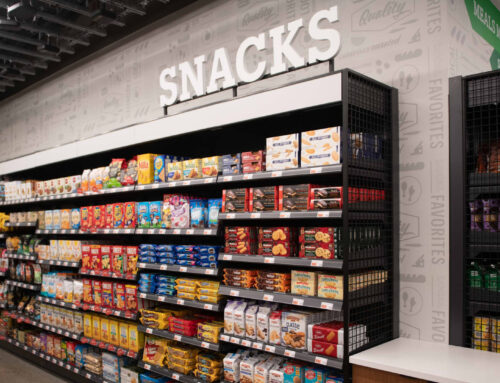EDB Highlights Eurasia’s Growth, Green Energy, and Integration at AIF 2025
May 30, 2025
ASTANA — The Eurasian Development Bank (EDB) held a session entitled Eurasia: Unlocking Growth, Embracing Global Trends at the Astana International Forum (AIF) 2025 on May 29. The session was held as part of the largest international event in the Central Asian region, chaired by the President of Kazakhstan Kassym-Jomart Tokayev.
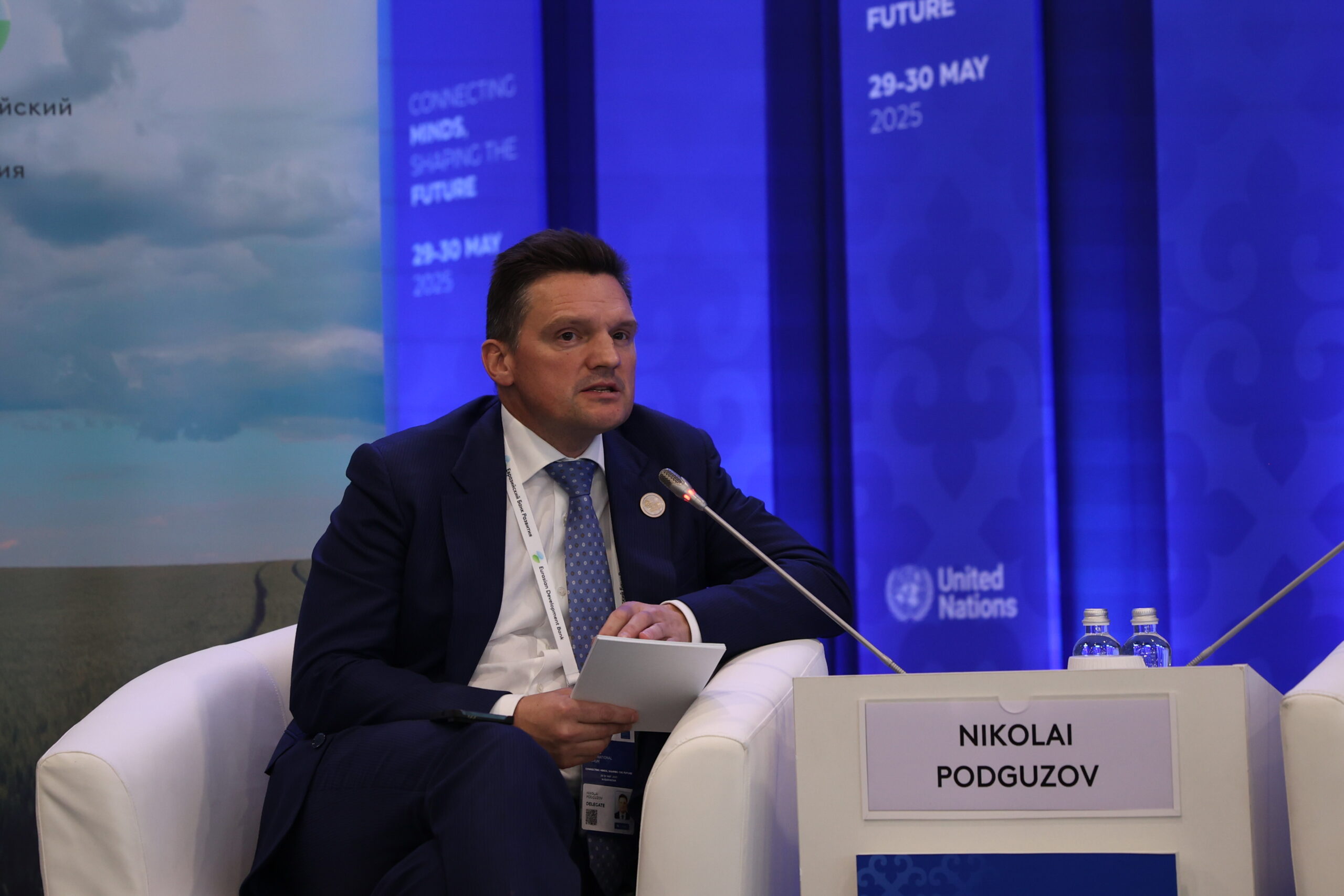
Nikolai Podguzov, Chairman of the EDB Management Board. Photo credit: AIF press service
The session was moderated by Nikolai Podguzov, Chairman of the EDB Management Board. Opening the session, Nikolay Podguzov highlighted that Kazakhstan and the broader Central Asian region have maintained strong economic growth for over two decades. He noted that this growth consistently outpaces global and developing country averages. In 2024, the combined GDP of Central Asian nations surpassed $500 billion.
“The foreign trade turnover has increased almost 9-fold since 2000. Foreign direct investment has increased 17-fold. To further maintain high growth rates, Kazakhstan and Central Asia need to use all the opportunities provided by the global economy. The task can be formulated as follows: act locally and unleash your inner potential while relying on global trends,” Podguzov said.
The discussion also focused on the transformational potential of the Eurasian region and its evolving role in the global economy, with particular emphasis on energy innovation, sustainable water resource management, and the development of transport infrastructure. EDB showcased specific examples of how its mega projects are reshaping the region’s economic landscape. As part of its 2022–2026 Strategy, the bank is implementing three major initiatives: the Water and Energy Complex of Central Asia, the Eurasian Transport Network, and the Eurasian Commodity Distribution Network.
Mohamed Jameel Al Ramahi, CEO of Masdar — one of the world’s fastest-growing renewable energy companies and a leader in green hydrogen production — stated that the world has reached a historic milestone: the combination of solar power and battery storage is accelerating the global transition to renewable energy. He emphasized that advances in energy storage technology have now made it possible to compete with traditional energy sources without the need for subsidies or higher costs.
“We see Central Asia as a promising region for such solutions and are ready to support governments and partners to accelerate this growth,” he noted.
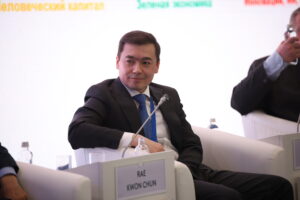
Vice Minister of National Economy Arman Kasenov. Photo credit: AIF press service
Masdar is currently partnering with Kazakhstan on an agreement to develop a one-gigawatt wind power project — the Zhambyl Wind Project — marking a major step in the country’s clean energy ambitions.
In response to a question from Podguzov about Kazakhstan’s priority economic sectors under its non-resource-based growth model, Vice Minister of National Economy Arman Kasenov emphasized that the Kazakh government is focusing on high-productivity, export-oriented industries, particularly in raw material processing. According to him, the diversification process is already delivering impressive results.
“Kazakhstan has a real opportunity to significantly expand the share of raw material processing industries. These currently account for around 70% of the country’s industrial output, and we see tremendous growth potential there. To further stimulate investment in these sectors, we’ve ramped up investment activity through national development financial institutions, which collectively are set to provide around $100 billion,” Kasenov noted.
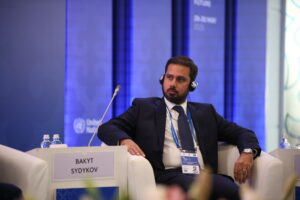
Mustafa Adil, Head of Islamic Finance, Data and Analytics at the London Stock Exchange. Photo credit: AIF press service
Mustafa Adil, Head of Islamic Finance, Data and Analytics at the London Stock Exchange, emphasized the growing significance of Islamic finance in the global economy. He noted that Islamic finance is no longer a niche segment, despite lingering misconceptions among those unfamiliar with the sector.
“It is now an industry worth more than $5 trillion within the financial services sector,” he added.
Rae Kwon Chung, Nobel Laureate and Board Director of the Ban Ki-moon Foundation for a Better Future, presented a sustainable cotton project for Central Asia. The idea centers on smart farms powered by green energy, which can reduce water use by up to 90%. With global brands seeking carbon-free products, the initiative could tackle environmental challenges while boosting export potential.
“Producing carbon-free energy and products — and selling them at a premium — is a clear green growth strategy. We’re investing in sustainability and making it profitable. This project is now being advanced in Kazakhstan and Uzbekistan, and I look forward to deepening cooperation and support,” Chung said.
EDB also presented an update on its activities in the region. In 2024, the bank invested $1.4 billion in Kazakhstan’s economy. In 2025, projects worth more than $4.5 billion are under consideration. A significant event was Uzbekistan’s accession as the EDB’s seventh member country in 2025.
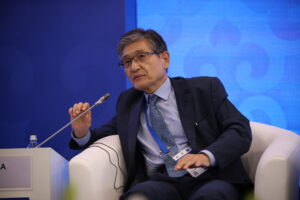
Rae Kwon Chung, Nobel Laureate and Board Director of the Ban Ki-moon Foundation. Photo credit: AIF press service
At the end of the session, the participants unanimously agreed that Central Asia is a region of new opportunities that can be realized through mutually beneficial cooperation. During the interactive voting, the experts identified the key drivers of growth in the region, including external and domestic demand, human capital development, green economy and innovative technologies.
Wrapping up the session, Podguzov emphasized that human capital remains a top priority, noting that “nothing happens without skilled professionals.” He also underscored the importance of advancing the green economy.
AIF 2025 convenes for the second time this year, bringing together prominent politicians to debate a range of topics, from geopolitical upheavals to green energy. This forum aims to tackle global challenges by amplifying diverse voices, just as President Tokayev emphasized in his address on the forum’s second day.
The general partner and sponsors of the AIF 2025 are the Samruk Kazyna National Welfare Fund, ERG and Freedom Bank Kazakhstan. The official sponsors are Kazakhmys, Karachaganak, KAZ Minerals, North Caspian Operating Company, Tengizchevroil, Alatau City, Baiterek Holding, VISA, Stepnogorsk Bearing Plant, Caspian Oil, Qarmet and RG Gold.
Get The Astana Times stories sent directly to you! Sign up via the website or subscribe to our X, Facebook, Instagram, Telegram, YouTube and Tiktok!
Search
RECENT PRESS RELEASES
Related Post


